COLUMBIA, S.C.
Organizers hope the third annual Bobby Bonds Memorial Symposium will help reverse the declining number of Blacks playing baseball at all levels. They also know that the job gets more difficult with every negative headline involving Bobby’s son, Barry.
It’s hard to find a day when San Francisco Giants star Barry Bonds isn’t dealing with his alleged involvement with steroids or other performance enhancing drugs. And that limits the younger Bonds’ impact as a role model for Black youths thinking of baseball, says former New York Mets outfielder Mookie Wilson.
“He is arguably the greatest baseball slugger. But right now, no one knows that. So, who are kids going to relate to?” says Wilson, best remembered for his role in game six of the 1986 World Series. First, Wilson skipped out of the way of Bob Stanley’s pitch that let New York tie Boston in the bottom of the 10th. Then Wilson hit the slow roller that Bill Buckner let get past him for a Mets victory, tying the series. Wilson and the Mets took game seven and the championship.
The event, titled the “Bobby Bonds Symposium on the Survival of Historical Black Colleges and Universities Baseball Programs,” will take place from July 27-30 at Benedict College. There will also be a youth baseball tournament sponsored by the Metropolitan Junior Baseball League (MJLB).
Wilson worries that Black participation in the game he loves has reached a critical low point and needs serious attention. The symposium comes just as Shaw University officials have decided to drop its intercollegiate baseball, golf and indoor track programs to save money and concentrate on football and basketball. The Division II school won the CIAA baseball title. But, the university’s decision leaves only five baseball teams in the historically Black conference.
Barry Bonds has been a polarizing force for much of his career, beloved by many for his skills but often trashed by critics. Bonds always contentious relationship with the media has made it difficult for young Blacks to latch on to Bonds the way Wilson looked up to Willie Mays and Hank Aaron while growing up.














